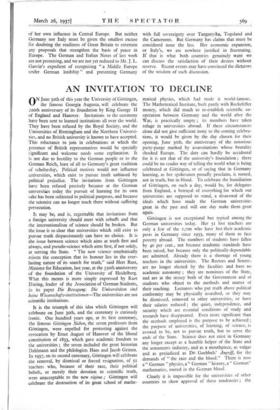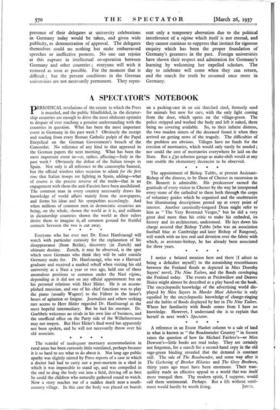AN INVITATION TO DECLINE
ON June 30th of this year the University of Gottingen, the famous Georgia Augusta, will celebrate the tooth anniversary of its foundation by King George II of England and Hanover. Invitations to the ceremony have been sent to learned institutions all over the world. They have been refused by the Royal Society, and the Universities of Birmingham and the Northern Universi- ties, and no British university is known to have accepted. This reluctance to join in celebrations at which the presence of British representatives would be specially significant and welcome needs some explanation. It is not due to hostility to the German people or to the German Reich, least of all to Germany's great tradition of scholarship. Political motives would not influence universities, which exist to pursue truth unbiased by political prejudice. The invitations from Gottingen have been refused precisely because at the German universities today the pursuit of learning for its own sake has been subjected to political purposes, and because the scientist can no longer teach there without suffering persecution.
It may be, and is, regrettable that invitations from a foreign university should meet with rebuffs and that the internationalism of science should be ,_broken. But the issue is so clear that universities which still exist to pursue truth dispassionately can have no choice. It is the issue between science which aims at truth first and always, and pseudo-science which aims first, if not solely, at serving the State. " The new science emphatically rejects the conception that its honour lies in the ever- lasting nature of its search for truth," said Herr Rust, Minister for Education, last year, at the 55oth anniversary of the foundation of the University of Heidelberg. What this means is more simply expressed by Kurt During, leader of the Association of German Students, in its paper Die Bewegung. Die Universitdten sind keine Wissenschafts-institutionen—The universities are not scientific institutions.
It is the triumph of this idea which GOttingen will celebrate on June 3oth, and the centenary is curiously ironic. One hundred years ago, at its first centenary, the famous Gottingen Sieben, the seven professors from Gottingen, were expelled for protesting against the revocation by Ernst August of Hanover of the liberal constitution of 1833, which gave academic freedom to the universities ; the seven included the great historian Dahlman and the philologists Hans and Jacob Grimm. In 1937, on its second centenary, Gottingen will celebrate the removal, by dismissal or forced resignation, of 51 teachers who, because of their race, their political beliefs, or merely their devotion to scientific truth, were unacceptable to the new regime ; Gottingen will celebrate the destruction of its great school of mathe- matical physics, which had made it world-famous. The Mathematical Institute, built partly with Rockefeller money, which did much to re-establish scientific co- operation between Germany and the world after the War, is practically empty ; its members have taken refuge in universities abroad. If these circumstances alone did not give sufficient irony to the coming celebra- tions, it would be given by the day chosen for their opening, June 3oth, the anniversary of the notorious party-purge marked by assassinations whose brutality shocked Europe. The date can hardly be accidental for it is not that of the university's foundation ; there could be no cruder way of telling the world what is being celebrated at Gottingen, or of saying that in Germany learning, as her spokesmen proudly proclaim, is rooted, not in truth, but in blood. To celebrate the humiliation of Gottingen, on such a day, would be, for delegates from England, a betrayal of everything for which our universities are supposed to stand, a disavowal of the ideals which have made the German universities great in the past and will one day make them great again.
Gottingen is not exceptional but typical among the German universities today. Her 51 lost teachers are only a few of the 1,700 who have lost their academic posts in Germany since 1933, many of them to face poverty abroad. The numbers of students have fallen by 40 per cent., not because academic standards have been raised, but because only the politically dependable are admitted. Already there is a shortage of young teachers in the universities. The Rectors and Senates are no longer elected by the faculties and have no academic autonomy ; they are nominees of the State, and are at the mercy both of the Government and of students who object to the methods and matter of their teaching. Lecturers who put truth above political conformity may be physically assaulted, or they may be dismissed, removed to other universities, or have their salaries reduced ; the quiet, independence, and security which are essential conditions of study and research have disappeared. Even more significant than the methods employed is the purpose to be achieved ; the purpose of universities, of learning, of science, is avowed to be, not to pursue truth, but to serve the ends of the State. Science does not exist in Germany any longer except as a humble helper of the State and the armaments industry, and as a mouthpiece, as vulgar and as prejudiced as Dr..Goebbels' Angrff, for the demands of " the race and the blood." There is now a " German " physics, a " German " history, a " German" mathematics, rooted in the German blood.
Clearly it is impossible for the universities of other countries to show approval of these tendencies ; the presence of their delegates at university celebrations in Germany today would be taken, and given wide publicity, as demonstration of approval. The delegates themselves could no nothing but make embarrassed speeches or ineffective protests. No one can rejoice at this rupture in intellectual co-operation between Germany and other countries ; everyone will wish it restored as soon as possible. For the moment that is difficult ; but the present conditions in the German universities are not necessarily permanent. They repre- sent only a temporary aberration due to the political interference of a regime which itself is not eternal, and they cannot continue to suppress that instinct for rigorous enquiry which has been the proper foundation of Germany's greatness in the past. Foreign universities have shown their respect and admiration for Germany's learning by welcoming her expelled scholars. The day to celebrate will come when they can return, and the search for truth be resumed once more in Germany.











































 Previous page
Previous page